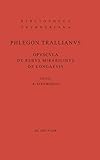Opuscula de rebus mirabilibus et de longaevis / Phlegon ‹Trallianus›; Antonio Stramaglia.
Material type: TextSeries: Bibliotheca scriptorum Graecorum et Romanorum TeubnerianaPublisher: Berlin ; Boston : De Gruyter, [2010]Copyright date: ©2011Description: 1 online resource (96 p.)Content type:
TextSeries: Bibliotheca scriptorum Graecorum et Romanorum TeubnerianaPublisher: Berlin ; Boston : De Gruyter, [2010]Copyright date: ©2011Description: 1 online resource (96 p.)Content type: - 9783110245974
- 9783110239058
- online - DeGruyter
- Issued also in print.
| Item type | Current library | Call number | URL | Status | Notes | Barcode | |
|---|---|---|---|---|---|---|---|
 eBook
eBook
|
Biblioteca "Angelicum" Pont. Univ. S.Tommaso d'Aquino Nuvola online | online - DeGruyter (Browse shelf(Opens below)) | Online access | Not for loan (Accesso limitato) | Accesso per gli utenti autorizzati / Access for authorized users | (dgr)9783110239058 |
Frontmatter -- De rebus mirabilibus -- De longaevis -- Indices
restricted access online access with authorization star
http://purl.org/coar/access_right/c_16ec
Nur zwei Werke Phlegons von Tralles (2. Jhdt. n. Chr.) sind heute noch erhalten: Über wundersame Dinge, eine der wichtigsten paradoxographischen Sammlungen der Klassischen Antike, vor allem bekannt durch ihre Geistergeschichten, von denen sich sogar Goethe inspirieren ließ, und Über langlebige Menschen, eine Zusammenstellung hundertjähriger Personen (aus literarischen und archivalischen Quellen), die für Althistoriker und Namenskundler von großem Interesse ist. Beide Texte sind durchzogen von (überwiegend Sibyllinischen) Weissagungen. Die Edition bietet neben einem verlässlichen griechischen Text auch die grundlegenden Werkzeuge für die wissenschaftliche Arbeit mit diesem faszinierenden Bereich des antiken Erbes.
Phlegon of Tralles, a learned freedman of Hadrian’s, was a prolific writer, but only two of his works have – though not entirely – survived: Peri thaumasion (‘On marvellous things’) and Peri makrobion (‘On long-lived persons’). The former is probably the main extant paradoxographic collection from classical antiquity, mostly famous for some memorable ghost stories (one of which inspired Goethe); the latter reviews long-lived individuals from both archival and literary sources. Both are extensively interespersed with oracles, Sibylline and others. These works were hitherto available in unsatisfactory editions. Stramaglia’s new edition relies on a fresh, meticulous collation of the codex unicus (Heidelberg, Palat. Gr. 398); takes complete account of scholarship from the editio princeps (1568) onwards; establishes the text according to a sounder evaluation of Phlegon’s language and style; and includes not only a detailed apparatus criticus, but also – for the first time – an apparatus auxiliarius providing loci similes vel paralleli, as well as close bibliographical references and elucidations of obscure or abstruse passages.
Issued also in print.
Mode of access: Internet via World Wide Web.
In Greek, Ancient (to 1453).
Description based on online resource; title from PDF title page (publisher's Web site, viewed 28. Feb 2023)


